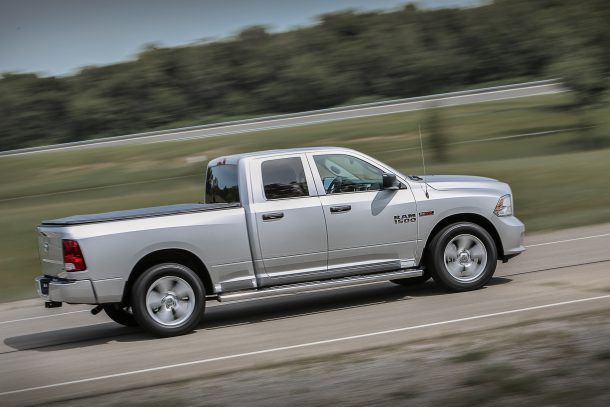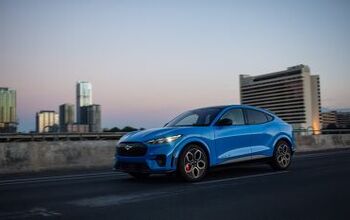When Will Fiat Chrysler Be Allowed to Sell 2017 EcoDiesel Jeeps and Rams? Possibly Not Until 2018 Models Roll Out

Ram and Jeep fans looking to get into a new 1500 or Grand Cherokee with the highest possible fuel economy picked the wrong year to embark on their search. While owners of 2014-2016 Ram and Grand Cherokee EcoDiesel models wonder whether their vehicles are polluting as the EPA claims, Fiat Chrysler Automobiles’ 2017 EcoDiesels languish in legal limbo.
At first, the Environmental Protection Agency held up the certification of 2017 models as it slogged through a backlog of extra-stringent testing prompted by Volkswagen’s diesel emissions scandal. Then, in January, FCA’s hopes of getting 2017 EcoDiesels to dealers hit a brick wall. The automaker was accused of violating environmental regulations after the EPA discovered unannounced emissions control devices on the models — raising concerns of a possible VW-type defeat device scheme.
Then came a lawsuit filed by the U.S. Department of Justice. So, when can diesel fans get their hands on a light-duty FCA oil burner? It could be a while.
In a court hearing Wednesday, a DOJ lawyer claimed the process of examining FCA’s proposed emissions fix could take “weeks or months.” The automaker filed another application for certification in May, just a few days before the DOJ lawsuit. In it, FCA detailed changes to emissions software it said would bring the vehicles into compliance, anticipating no impact on fuel economy or performance.
Both the EPA and California Air Resources Board would need to test vehicles equipped with the updated emissions control system before greenlighting an emissions certificate. Once that occurs, the same fix would be offered to owners of some 104,000 older models.
According to Reuters (via Automotive News), FCA has held six meetings or phone calls with regulators in the past three weeks.
While the company waits for bill of health from the EPA (and hopes to avoid billions in fines), there’s more bad PR to worry about. West Virginia University, the institution that discovered Volkswagen’s emissions cheating, plans to release a study on the 3.0-liter diesel models’ real-world emissions. After reviewing the study, The Wall Street Journal reported this week that the models emit between eight to 25 times the legal amount of smog-producing emissions.
FCA quickly denied the claims, questioning the university’s testing procedure — and motivations.
[Image: Fiat Chrysler Automobiles]

More by Steph Willems
Latest Car Reviews
Read moreLatest Product Reviews
Read moreRecent Comments
- Corey Lewis It's not competitive against others in the class, as my review discussed. https://www.thetruthaboutcars.com/cars/chevrolet/rental-review-the-2023-chevrolet-malibu-last-domestic-midsize-standing-44502760
- Turbo Is Black Magic My wife had one of these back in 06, did a ton of work to it… supercharger, full exhaust, full suspension.. it was a blast to drive even though it was still hilariously slow. Great for drive in nights, open the hatch fold the seats flat and just relax.Also this thing is a great example of how far we have come in crash safety even since just 2005… go look at these old crash tests now and I cringe at what a modern electric tank would do to this thing.
- MaintenanceCosts Whenever the topic of the xB comes up…Me: "The style is fun. The combination of the box shape and the aggressive detailing is very JDM."Wife: "Those are ghetto."Me: "They're smaller than a Corolla outside and have the space of a RAV4 inside."Wife: "Those are ghetto."Me: "They're kind of fun to drive with a stick."Wife: "Those are ghetto."It's one of a few cars (including its fellow box, the Ford Flex) on which we will just never see eye to eye.
- Oberkanone The alternative is a more expensive SUV. Yes, it will be missed.
- Ajla I did like this one.


































Comments
Join the conversation
You would think that with all the emissions equipment that car tailpipes would be bare metal yet they are mostly sooty. Many Fords are clean but many Hondas are sooty as anecdotal evidence. Most cars would seem to pass lab tests but fail on the open road. Aren't these small turbocharged engines the worst offenders?
After WVU blew the whistle on VW, VW confessed almost immediately. In this case, I still don't trust WVU's claims because of the dispute about test methodology. FCA's wouldn't be so persistent with CARB and the EPA if they believed they were still out of compliance. For their parts, I blame VW for poisoning the diesel well with CARB and EPA. Now they mistrust everyone.